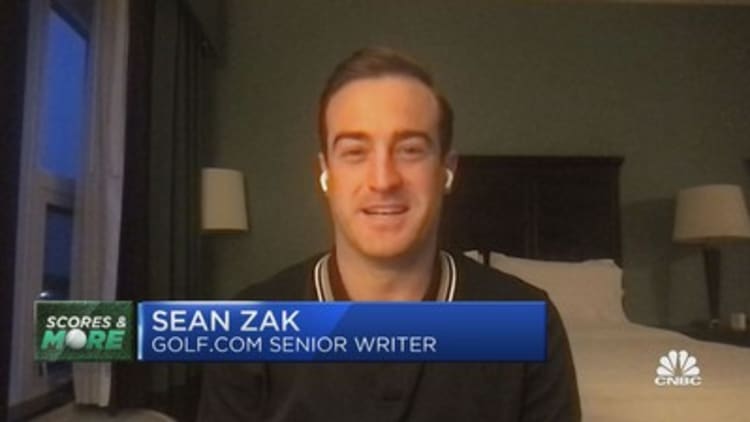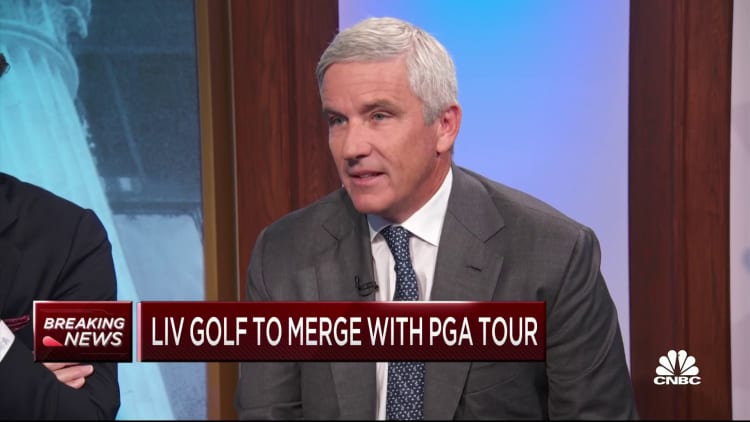

The proposed merger between the PGA Tour and its Saudi-funded rival LIV Golf stunned everyone from golfers to Wall Street bankers this week – leaving many with questions about what the merger could mean.
The deal was announced following months of feuding and antitrust lawsuits between the two leagues. The agreement would end all pending litigation.
PGA Tour Commissioner Jay Monahan told CNBC’s “Squawk on the Street” on Tuesday that while there has been a lot of “tensions” between the two organizations, the deal was a benefit to the game of golf.
Despite those tensions being settled between the tour and LIV, they could be relevant when regulators comb over the deal.
“The commissioner’s statement that this is necessary to end all this tension leaves the question of what do we mean when we say tension? That could be from a competition angle, which is a good thing for pricing and consumers,” said Henry Hauser, a former FTC lawyer and currently an antitrust attorney at Perkins Coie. “It can also mean tension in the sense of a distraction.”
While the two organizations were feuding, golfers were divided between the PGA Tour and LIV. Some left for the hefty paychecks being doled out by LIV, even as they lost their endorsements. Others turned down big paydays to stay with the tour. Monahan has been outspoken in the past, saying he believed players would face “significant implications” for going to LIV. On Tuesday, he said he expected to be called a hypocrite and accepts the criticism.
Since the announcement, several players have voiced their frustration with the deal. Sponsors, likewise, have been slow to make statements or decisions, likely waiting to see how the deal is structured and the regulatory process goes, according to two sponsors close to the tour.
Aside from the lawsuits, LIV Golf has been surrounded by controversy and criticism since its launch in 2022. Backed by the Saudi Arabia Public Investment Fund – an entity controlled by the Saudi crown prince – critics have accused the sovereign wealth fund of “sportswashing” by using LIV Golf to distract from the kingdom’s history of human rights violations.
Antitrust concerns
Lawsuits rolled out from both sides last year as LIV aggressively lured high profile players, including Phil Mickelson and Bryson DeChambeau, away from the tour for big paychecks.
In response the tour had increased its prizes and player benefits, as well as secured loyalty agreements from its top players as it tried to prevent further poaching.
Both leagues had claimed that the other’s contracts and policies restricted golf talent and stifled proper competition. LIV Golf sued the tour, also citing anti-competitive practices for banning its players. The PGA Tour countersued.
The proposed deal, which includes Europe’s DP World Tour, puts an end to all of the fighting – in and out of court.
While Public Investment Fund Governor Yasir Al-Rumayyan said he expected the deal to be finalized in a matter of weeks, some question how quickly it’ll bypass U.S. regulatory agencies like the Federal Trade Commission and the Justice Department.

“Anything that happened before this announcement is still actionable,” said Hauser, noting the DOJ could still look into these claims outside of the merger process. “You can’t use a settlement as a masquerade.”
Hauser noted that while it’s always preferred to keep matters out of the courtroom, settlements themselves are bound by antitrust laws – “especially if there’s a legitimate legal dispute between the entities.”
Although the deal could close relatively quickly without requiring regulatory approval, lawmakers could raise issues afterward. This happened recently when the Justice Department ordered the end of American Airlines and JetBlue Airways alliance, saying the merger would hurt consumers by driving up fares. American Airlines plans to appeal the ruling.
The new entities need to show that the merger is to the benefit of consumers, especially on a global basis, by bringing the best talent together under one umbrella and expanding the reach of the game, said Timothy Derdenger, an assistant professor of marketing and strategy at Carnegie Mellon University’s Tepper School of Business.
“If the deal will be able to show it supports the growing purses for the golfers, and lead to more engagement and innovation to golf, which adds value to viewers, I don’t see much of a fight coming from the U.S. government,” Derdenger said.
Sponsorships and the Saudis
The deal also prompted questions about how it might affect sponsors of the PGA Tour, as well as its players’ endorsements.
Many have been outspoken about LIV’s financial backer, PIF, and have even protested at events.
Family members of those who perished in the Sept. 11, 2001, terrorist attacks have protested LIV events due to its Saudi ties. U.S. officials have concluded that Saudi nationals helped fund the terrorist group al-Qaeda, which were linked to the terrorist attacks on Sept. 11, although the investigations haven’t found that the Saudi officials were complicit in the attacks.
On Tuesday the group 9/11 Families United slammed the merger, especially after Monahan, the PGA Tour commissioner, raised this publicly last summer in an interview. “I would ask any player who has left or any player who would consider leaving, ‘Have you ever had to apologize for being a member of the PGA tour?'” Monahan said during an interview with CBS Sports last year.
Major sponsors of the tour have yet to speak out or make decisions. At least one sponsor is waiting to see how the regulatory process plays out for the deal before making decisions, according to a person familiar with the matter, who declined to be named because the internal discussions are private. Other sponsors have not yet commented publicly on the matter.
Marketers, advertisers and sponsors have pulled out from other partnerships when controversies have raised concerns.
“The fundamental reason why the brands we work with decide to invest in something is to leverage the power of that equity to connect with their customers,” said Sampson Yimer, a senior vice president of sponsorship consulting at Momentum Worldwide. “When that equity is degraded in any sort of way or has potential to do so, it causes these brands to potentially rethink their investments or to press pause.”
Soon after joining LIV, Mickelson made disparaging comments about the tour and showed his support for the Saudis. The top golfer lost his endorsements from the likes of KPMG and others, some of which were more than a decade old.
“If it’s at all a consideration, it’s something we counsel our clients on,” said Yimer. “I imagine this deal could have a chilling effect.”
However, the combination of the leagues could also lead to more endorsements, at least in the long run.
“The players that left and lost their endorsements, they will be able to reengage those sponsorships and endorsements because this brings them back into the fold,” said Derdenger.


